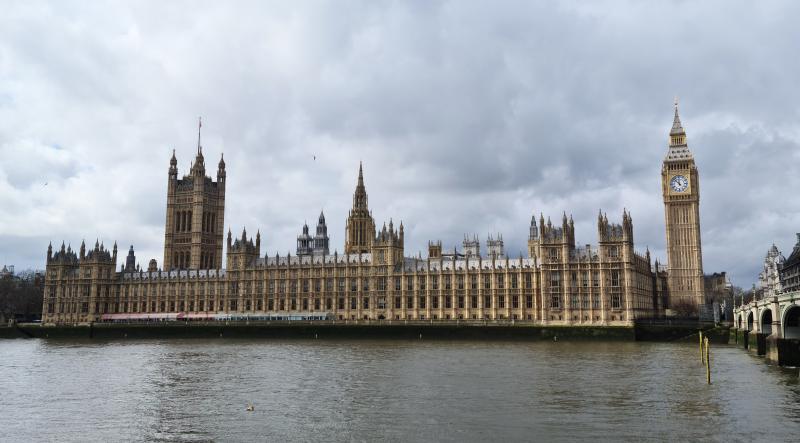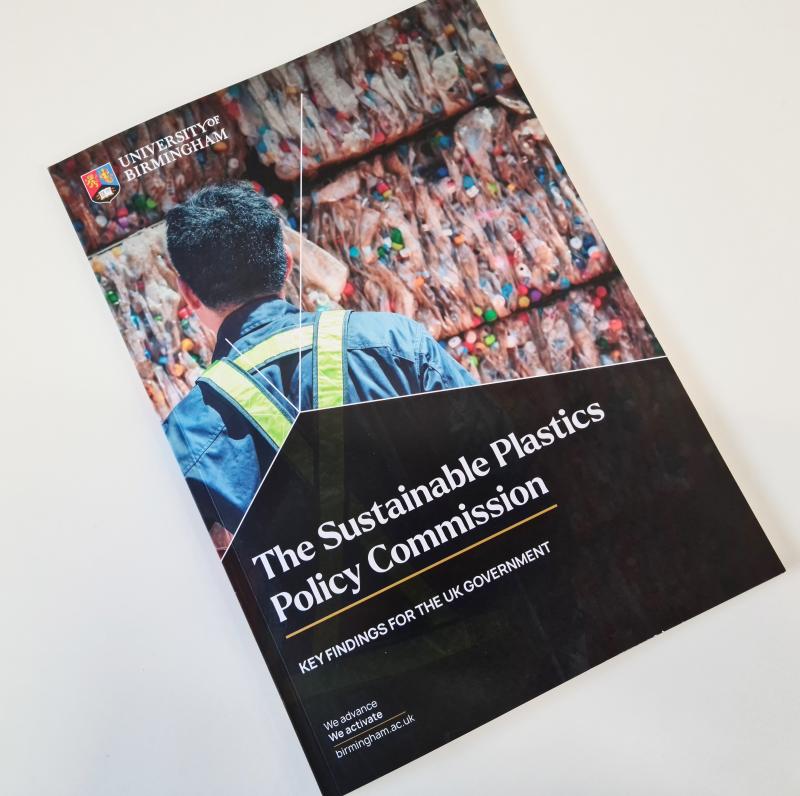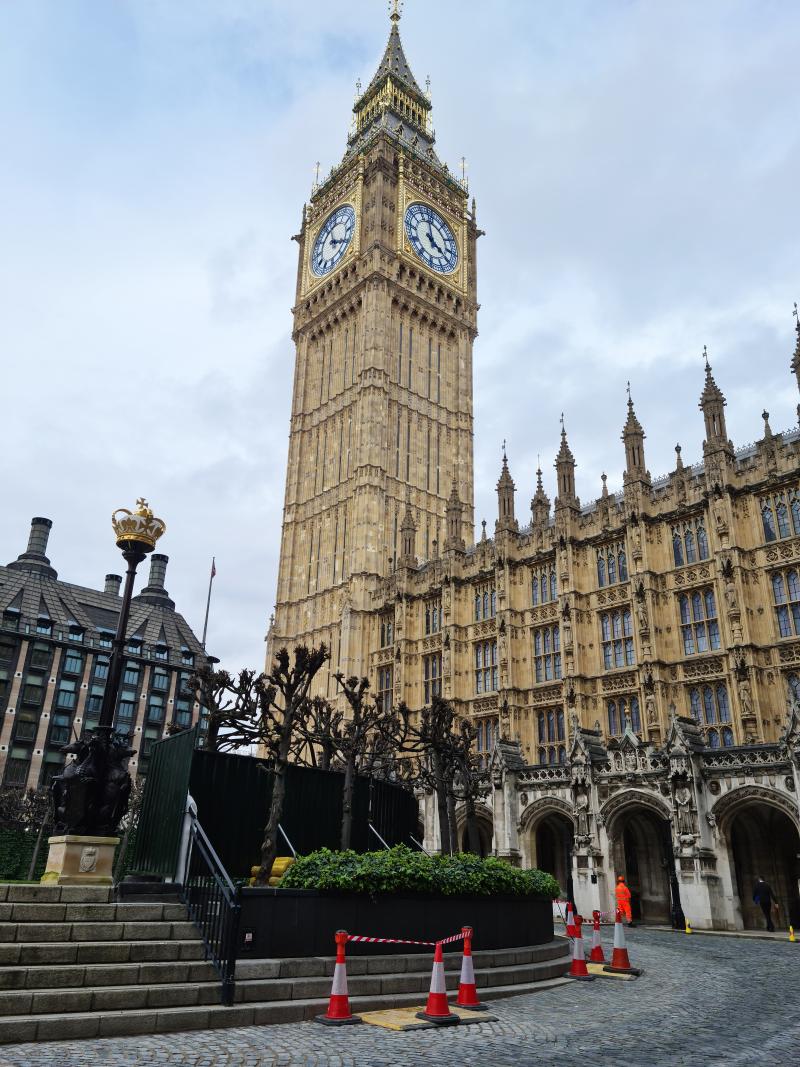
On Monday 18th March, my colleague Dr Christian McLening, Director of Research and Development at AUB, and I were invited to join the University of Birmingham at the launch of their Sustainable Plastics Policy Commission at the House of Commons, London. We were invited on the back of our successful bid for funding to develop a research centre here at AUB - https://aub.ac.uk/latest/aub-receives-1-6-million-grant-for-research-into-plastics-innovation.

Image: My invitation and visitor pass.
The University of Birmingham’s Plastics Network is made up of an interdisciplinary team of over 60 researchers, working together to shape the fate and sustainable future of plastics. The Policy Commission brought together some of these researchers with people from across the plastics landscape to develop a set of evidence-based policy recommendations that will promote a sustainable future for plastics in the UK, enhancing the positive contributions that plastics make to our lives whilst minimising the negative impacts across their life cycle.
The policy commission has been a year long process starting with the launch of a Call to Action Report in January 2023. The commission process was chaired by Baroness Meacher and included the following commissioners and over 40 expert witnesses:
- Professor Sally Beken, Founder and Lead of the UK Circular Plastics Network at Innovate UK Business Connect.
- Professor Andrew Dove, Professor of Sustainable Polymer Chemistry at the University of Birmingham.
- Simon Ellin, Independent, Previous CEO of the Recycling Association.
- Professor Fern Elsdon-Baker, Professor of Science, Knowledge and Belief in Society and Director of Research Institute for STEMM in Culture and Society (ISTEMMiCS) at the University of Birmingham.
- Judit Guerra-Falcon, Technical Affairs and Circular Economy Manager, Plastics Europe.
- Keith James, Head of Policy and Insights, WRAP.
- Professor Stefan Krause, Professor of Ecohydrology and Biogeochemistry at the University of Birmingham.
- Professor Richard Lampitt, Professor at the National Oceanography Centre.
- Brian Lodge, Director of Packaging, British Plastics Federation.
- Professor John McGeehan, Independent Consultant, Recycling, Upcycling and Redesign.
- Asim Shah, Managing Director at (SC)2, Supply Chain Sustainability Consulting.
- Professor Ian Thomson, Professor of Accounting and Sustainability, the University of Dundee.

Image: The Sustainable Plastics Commission report
The commission has the following recommendations:
Harness the tax system to promote sustainable decisions.
Tax is a powerful instrument to ensure end of life impacts are priced into materials. The UK’s 2022 Plastic Packaging Tax, applied to products that do not contain at least 30% recycled plastic, was a welcome step in encouraging circular economy practices. The Government could now introduce a sliding scale to reward companies that surpass the 30% threshold, with appropriate measures to mitigate the risk of fraud. To support the packaging industry to adjust, the Government should consider corresponding investments in plastic and waste management infrastructure to ensure sufficient availability of recycled plastics. The Government could raise the threshold in the medium term and use additional tax instruments to target the most difficult-to-recycle plastics, for example, or the most environmentally problematic.
Broaden the scope of Extended Producer Responsibility (EPR) beyond packaging and create a ‘demand pull’ for sustainable alternatives across sectors.
EPR incentivises sustainable product design and the prevention or minimisation of plastic waste by making producers financially responsible for their products at the end of life. The UK’s EPR scheme, set to begin in 2025, targets 62% of packaging waste by 2030, with a collection scheme for films and flexibles to begin in 2027. While welcome, these targets are lower than EU packaging targets, which are 65% by the end of 2025 and 70% by 2030. EPR should also go beyond packaging; textiles and construction are two potential sectors of application.
Incineration remains a dominant waste management method and produces greenhouse gas emissions (GHGs) and toxic pollutants, including acid gases and heavy metals; the Government should set ambitious but achievable targets to reduce incineration and landfilling.
Due to heavy reliance on landfilling and incineration, the UK’s plastic consumption results in 26 million metric tons of carbon dioxide equivalent emissions over the entire lifecycle. This indicates how plastics management performance directly impacts the UK’s progress towards net zero. The Government should urgently set ambitious targets to reduce incineration and review current incentive frameworks to keep polymeric carbon in the economy for longer.
Strengthen regulation and oversight on compostable and biodegradable plastics.
Biodegradable and compostable plastics production is rising, but while these are primarily composed of non-fossil-based carbon feedstocks, they require appropriate recovery systems to ensure they are disposed of correctly. Otherwise, they may contaminate existing recycling streams or end up in natural environments where they may not biodegrade, rather than in industrial composting environments. Stronger oversight of marketing claims, enforced by the Competition and Markets Authority (CMA), can improve consumer awareness as part of a broader push to tackle greenwashing. There is a lack of public understanding of the term ‘biodegradable,’ which can be used in misleading ways.
Build the evidence base on plastic pollution’s human and environmental harms.
There is mounting evidence that plastic pollution harms environmental systems and human health, especially as plastics break down, allowing additives to enter ecological and biological systems. These effects increase risks of future governmental expenditures to treat, mitigate or remediate externalised costs. Plastic incineration is also associated with health impacts in nearby areas. Given that data and evidence is fragmented and often based on laboratory studies that do not approximate actual levels of exposure, the Government should invest in building the evidence base further. It should continue to lead global coordinated efforts in this area, supporting the development of the UN science-policy panel to contribute to the sustainable management of chemicals and waste to prevent the harm caused by pollution. The Government should propose that plastic additives are a priority for this panel and lead in developing an international consensus on action. The UK science base also has the opportunity to spearhead and become a world leader in research methodologies to tackle issues like ‘regrettable substitution’. These methodologies could include precision toxicology approaches that leverage genetics, genomics, metabolomics, and related fields to enable toxicological review of chemicals by groupings, rather than individually. The Government could also consider setting environmental migration limits for companies to prove additives do not migrate out of plastics under certain conditions.
Drive innovation in sustainable plastics through a national centre of excellence.
Due to an uncertain policy landscape, an unclear strategy and unpredictable reform timelines, the UK currently limits investment in plastics recycling and innovation. The Government is uniquely placed to unite diverse actors through a world-leading national sustainable plastics innovation research centre that can pool skills and investment to encourage co-creation across academic disciplines and industries. Such an institute, which extends the work of centres in other nations, including the Netherlands and Germany, can encourage long-term ambitious thinking and signal to the private sector that sustainable plastics are part of the UK’s low-carbon future. Building on the success of the UKRI Plastics Research and Innovation Fund and the Smart Sustainable Plastics Packaging Challenge, the UK should further incentivise researchers and companies to become world leaders in circular polymer systems, from materials design to next-generation recycling. These incentives could include blended finance, investor partnerships, competitions, and challenge funding, access to subsidised land, and scaling up pilot and full-scale facilities in key areas like chemical recycling, which have already delivered benefits, such as those within the Teeside Freeport area, which hosts the largest chemical recycling facility in the country. The Government should also support private sector innovation by sticking to timelines on reforms like the Deposit Return Scheme (DRS), thereby demonstrating a long-term commitment to the circular economy and giving confidence to investors.
Utilise procurement to raise sustainability data and standards in plastics.
The Government should use procurement to spark innovation and encourage best practices through protocols on holistic life cycle assessments and sustainability metrics. This could be achieved through a dedicated task force, harnessing insights from research, non-governmental bodies, and academic, certification, and standardisation bodies, as part of the broader effort to improve ESG reporting. The UK Government can encourage best practices and evidence-based decision making by using the most robust methodologies in public sector procurement for all materials, such as creating data quality scoring systems and promoting open data sharing.
Reform ‘end of life’ licensing to support green growth and incentivise the emergence of next-generation production and recycling technologies.
The current waste permitting system needs to be re-defined to accelerate circular economy models and support green growth by allowing plastic waste to be revalorised to benefit the environment and the economy. The UK Government should instruct the relevant bodies (Environment Agency in England, SEPA in Scotland, Natural Resources Wales in Wales, and NIEA in Northern Ireland) to agree to end-of-waste criteria that incentivise recirculation of polymeric carbon. Current UK waste licensing directives determine that an item can be waste if there is no certainty that it will be used. To decide if the materials’ use is certain, the applicant must consider if there is a market or demand for all the materials. Awarding more opportunities to companies seeking to use materials innovatively may foster the market for materials.
The launch of the Policy Commission was a fascinating event, what is interesting about the project is that is it is pragmatic about the use of plastics. It acknowledges that plastics play important roles in society but that we need to value them and use them appropriately which is inline with MoDiP's agenda too. We enjoyed finding out about the work of the University of Birmingham and really look forward to following what happens next. However, we also enjoyed being in the House of Commons which is such an amazing building and we were struck by the history of the place and being able to see some fabulous architectural features, and experience different views of such a well-known landmark.

Image: Christian McLening and I in the beautiful building with vaulted ceiling and stained glass windows

Image: A different view of the Elizabeth Tower complete with two varieties of traffic cones.

Image: A protestor outside the House of Commons demonstrating against plastics pollution. Something that the commission could help to prevent.
The Policy Commission can be found online - https://www.birmingham.ac.uk/documents/college-eps/plastics/uob-plastics-pc-2024-v2.pdf
Louise Dennis, Curator of MoDiP
